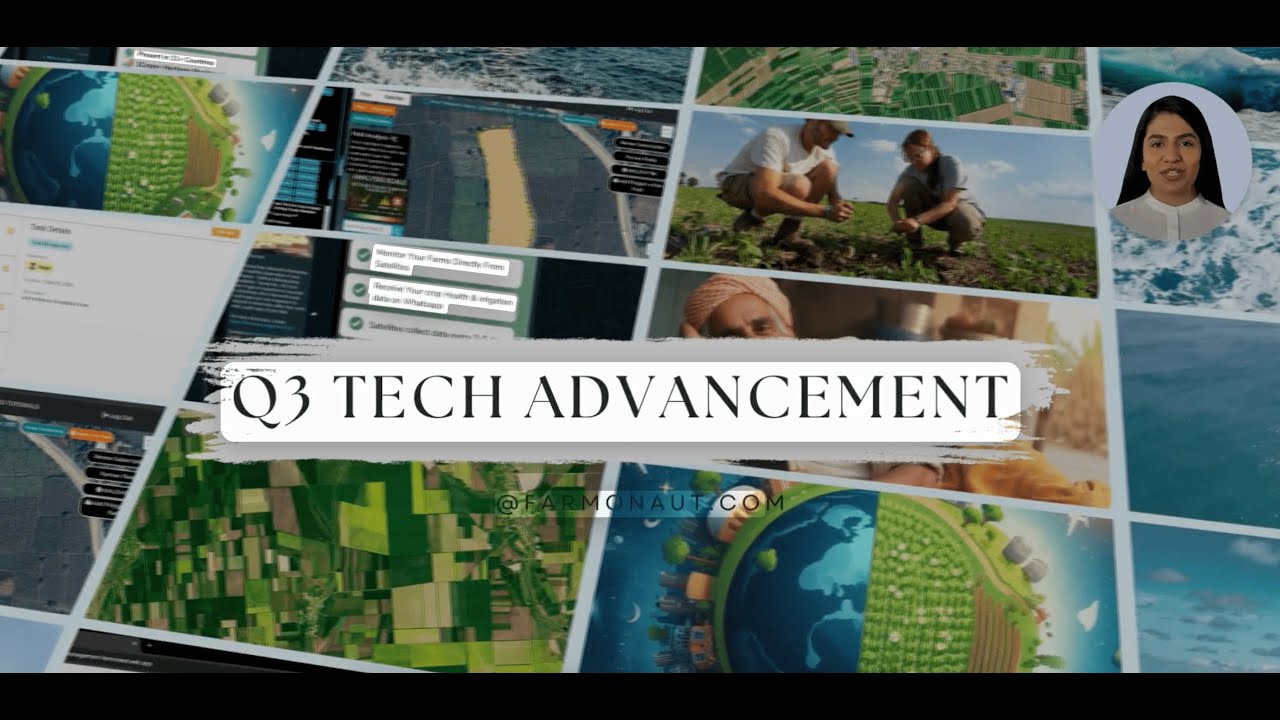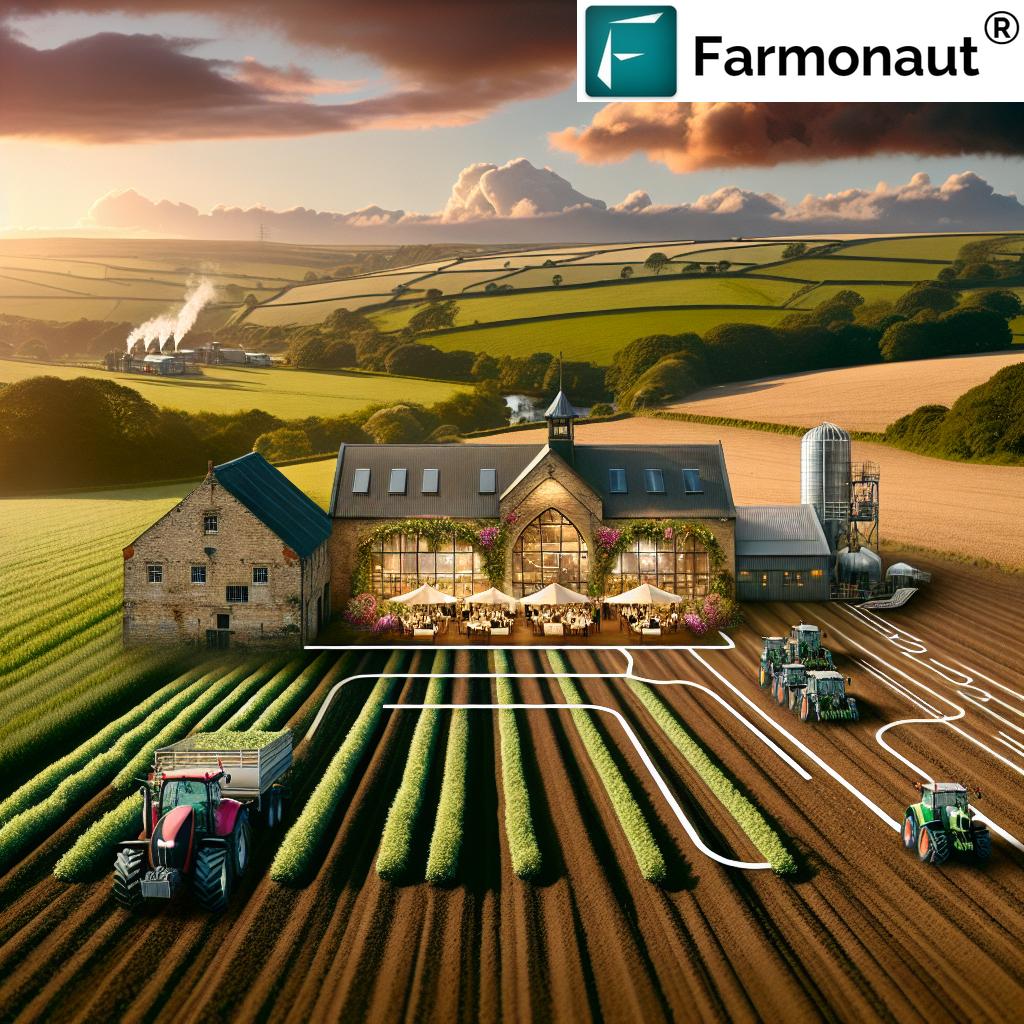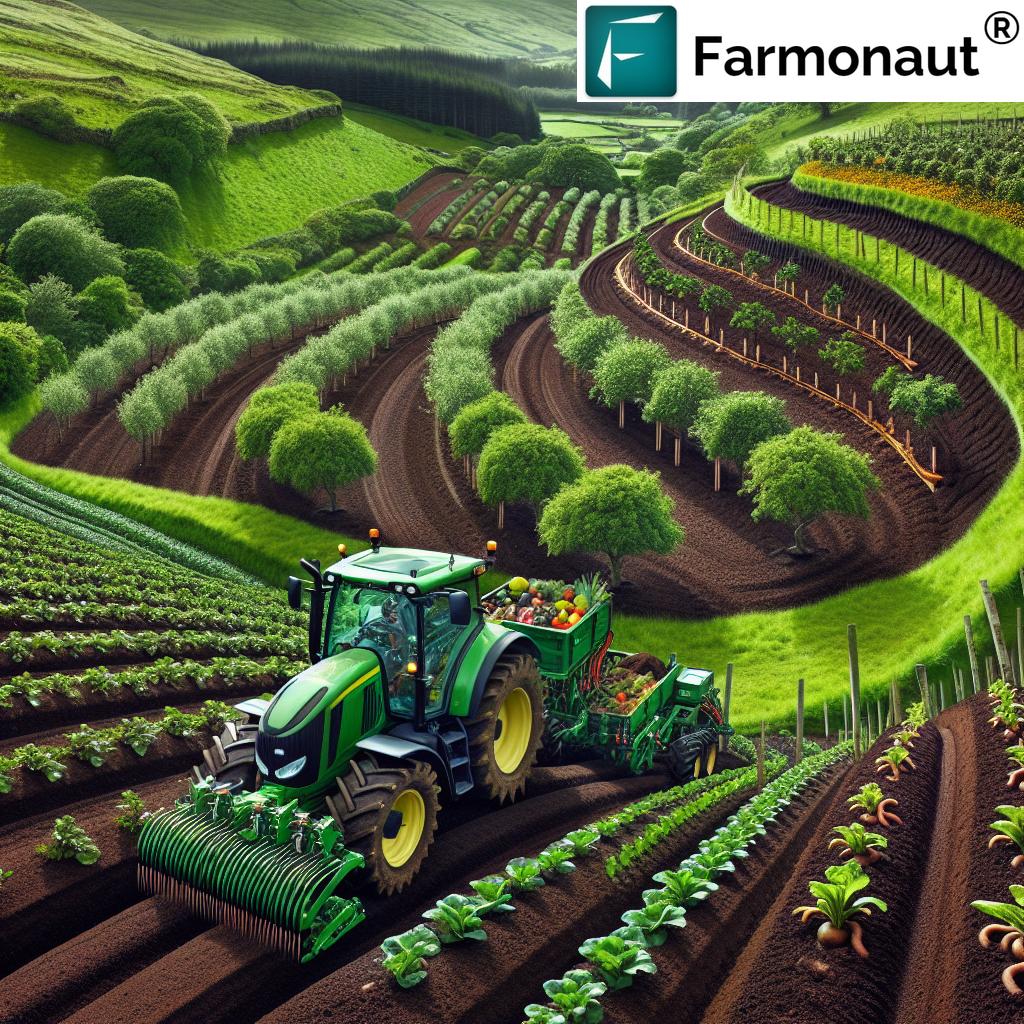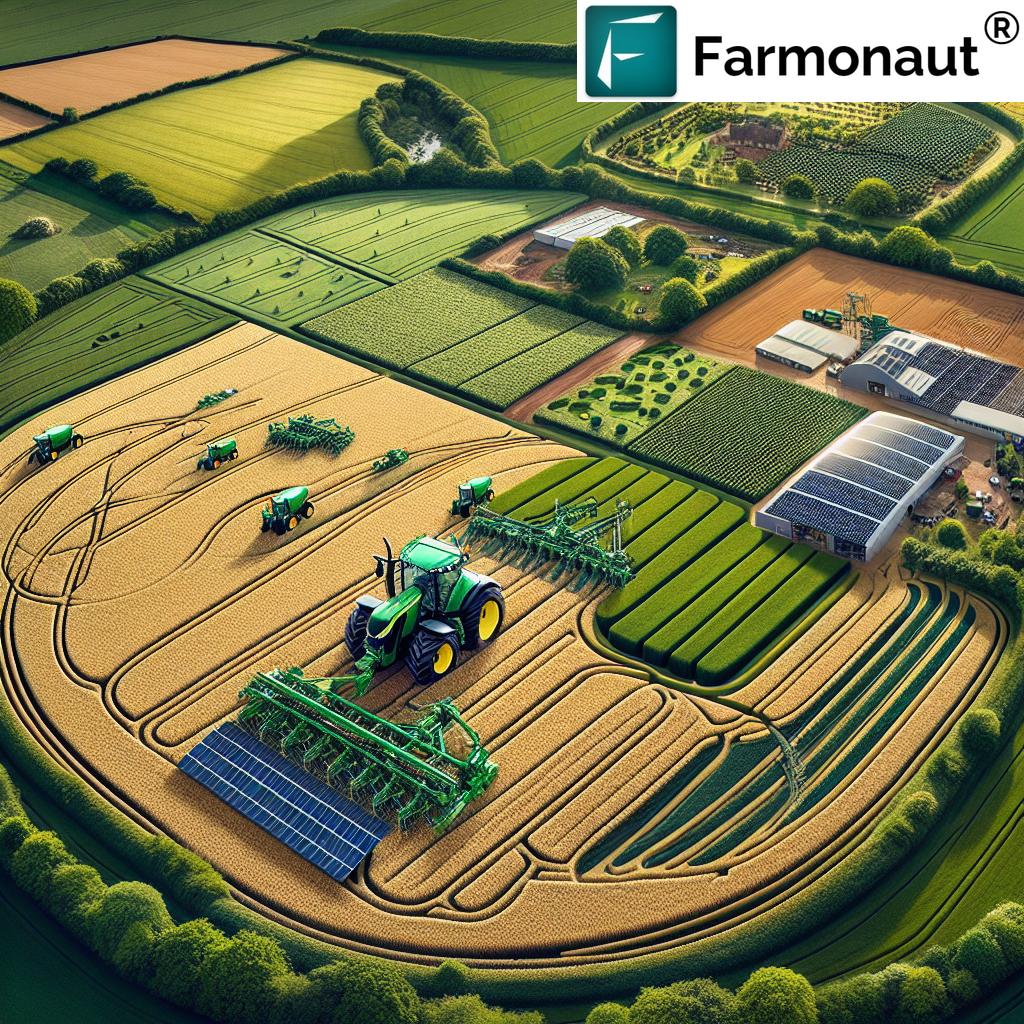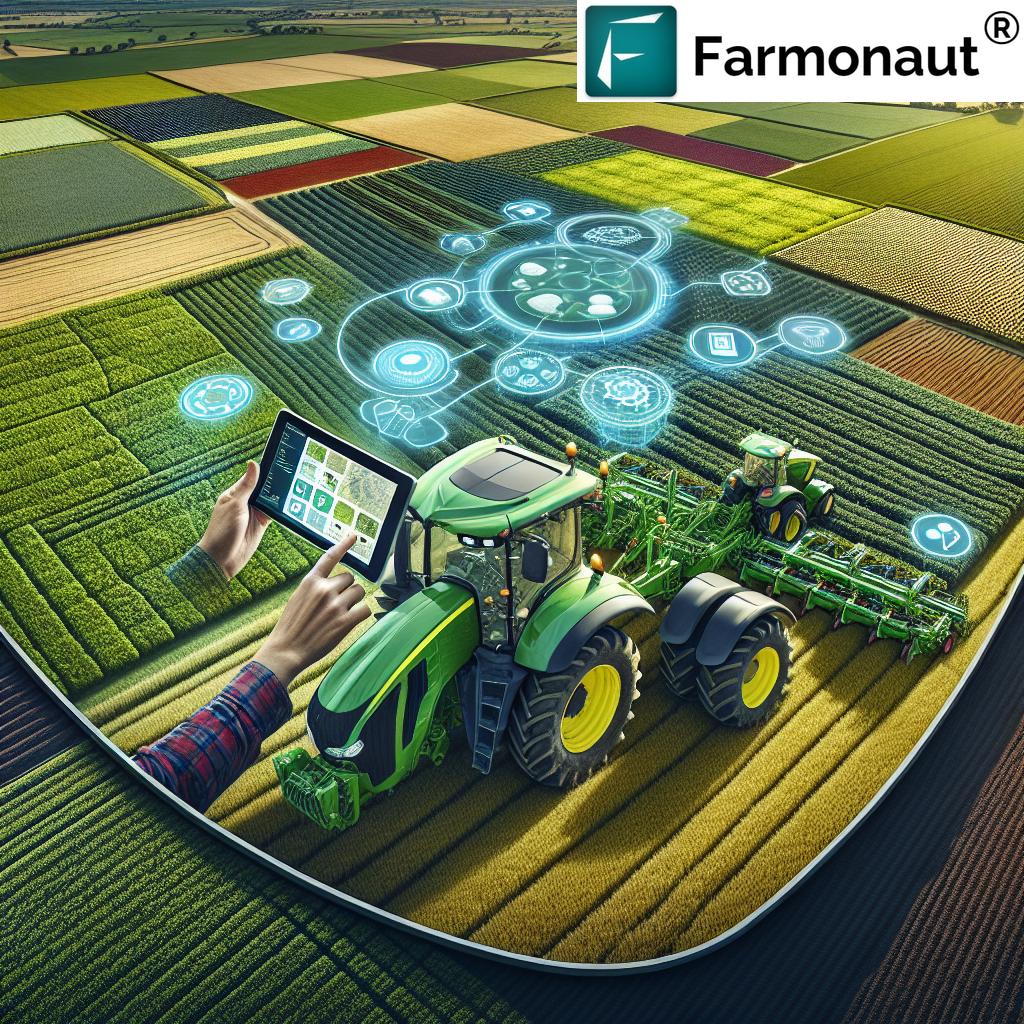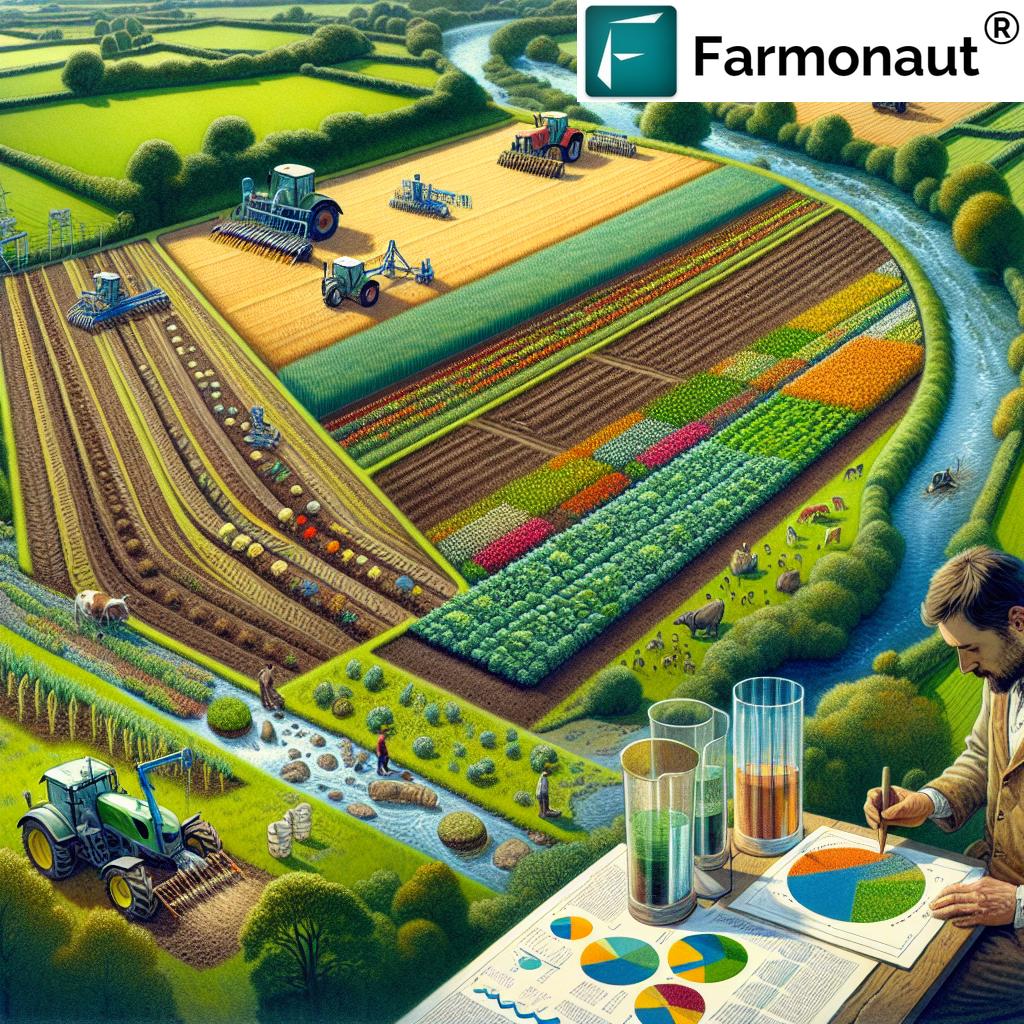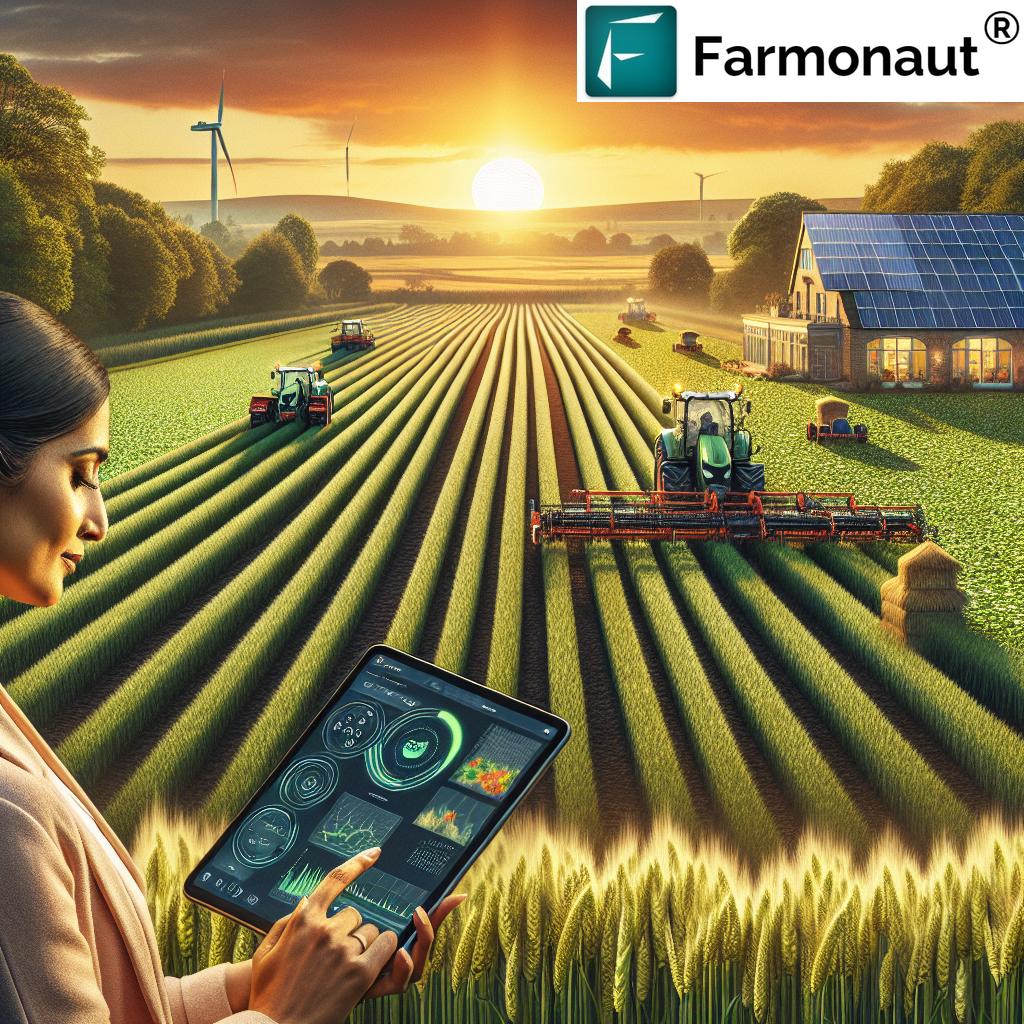Scottish Farmers Embrace Precision Agriculture: Farmonaut’s Tech Solutions for Sustainable Land Use and Climate Adaptation
“Scottish farmers adopting precision agriculture techniques have seen up to 20% increase in crop yields.”
In the rolling hills and fertile plains of Scotland, a quiet revolution is taking place. Scottish farmers, known for their resilience and innovation, are at the forefront of adopting precision agriculture techniques and sustainable land use practices. As we delve into the transformative landscape of Scottish farming, we’ll explore how cutting-edge technologies, including those offered by Farmonaut, are reshaping the agricultural sector and paving the way for a more sustainable and climate-resilient future.

The Evolution of Scottish Agriculture
Scottish agriculture has long been a cornerstone of the country’s economy and cultural identity. From the vast sheep farms in the Highlands to the arable lands of the Lowlands, farming has shaped Scotland’s landscape for centuries. However, the industry faces unprecedented challenges in the 21st century, including:
- Climate change impacts
- Market fluctuations
- Pressure to increase productivity while reducing environmental footprint
- Brexit-related uncertainties
In response to these challenges, Scottish farmers are turning to innovative solutions and embracing precision agriculture techniques. This shift is not just about adopting new technologies; it’s about fundamentally changing how we approach farming to ensure sustainability and resilience in the face of global challenges.
Precision Agriculture: The Game-Changer
Precision agriculture is revolutionizing the way Scottish farmers manage their land and resources. By leveraging advanced technologies such as satellite imagery, GPS, and data analytics, farmers can make more informed decisions about every aspect of their operations. Here’s how precision agriculture is making a difference:
- Crop Health Monitoring: Satellite-based solutions, like those offered by Farmonaut, provide real-time insights into crop health, allowing farmers to identify and address issues before they become problematic.
- Resource Optimization: Precision agriculture enables farmers to apply water, fertilizers, and pesticides with pinpoint accuracy, reducing waste and environmental impact.
- Yield Prediction: Advanced analytics help farmers forecast yields more accurately, enabling better planning and market engagement.
- Weather Adaptation: With more precise weather data and forecasts, farmers can make timely decisions about planting, harvesting, and crop protection.
Farmonaut’s platform is at the forefront of this technological revolution, offering Scottish farmers access to cutting-edge satellite imagery and AI-powered insights. By integrating these tools into their daily operations, farmers can significantly improve their productivity and sustainability.
Climate Change Adaptation in Scottish Agriculture
Climate change poses significant challenges to Scottish agriculture, from increased frequency of extreme weather events to shifts in growing seasons. However, Scottish farmers are proving their adaptability by implementing innovative strategies:
- Diversification of Crops: Farmers are exploring new crop varieties that are more resilient to changing climate conditions.
- Water Management: Improved irrigation systems and water conservation techniques are being implemented to cope with both droughts and floods.
- Soil Health Initiatives: There’s a growing focus on improving soil health to enhance resilience and carbon sequestration.
- Renewable Energy Integration: Many farms are investing in wind, solar, and biomass energy to reduce their carbon footprint and create additional income streams.
Farmonaut’s technology plays a crucial role in these adaptation efforts by providing farmers with detailed insights into their land and crops. The platform’s AI-driven advisory system, Jeevn AI, offers personalized recommendations that help farmers adapt their practices to changing climate conditions.
Government Support and Environmental Farming Policies
The Scottish government has been proactive in supporting the rural economy and promoting sustainable agriculture practices. Key initiatives include:
- Agri-Environment Climate Scheme (AECS): Provides funding for farmers implementing environmentally friendly practices.
- Scottish Rural Development Programme (SRDP): Offers support for rural businesses and communities, including farmers adopting sustainable practices.
- Farm Advisory Service: Provides expert advice to farmers on various aspects of farm management, including sustainability and technology adoption.
These policies align well with the precision agriculture solutions offered by companies like Farmonaut, creating a supportive ecosystem for farmers looking to innovate and adapt.
Farm Diversification Strategies
Scottish farmers are increasingly looking beyond traditional agriculture to ensure the long-term viability of their businesses. Diversification strategies include:
- Agritourism: Opening farms to visitors for experiences and education.
- Value-Added Products: Developing on-farm processing facilities to create premium products.
- Non-Agricultural Ventures: Using farm assets for activities like event hosting or renewable energy generation.
Farmonaut’s technology supports these diversification efforts by providing farmers with detailed land use data and analytics, helping them make informed decisions about how to optimize their resources for various ventures.
Explore Farmonaut’s API Solutions
The Role of Data in Modern Scottish Farming
Data has become the new currency in agriculture, and Scottish farmers are leveraging it to drive efficiencies and improve decision-making. Key aspects of data-driven farming include:
- Farm Management Software: Integrating various data sources for comprehensive farm oversight.
- IoT Sensors: Collecting real-time data on soil conditions, livestock health, and equipment performance.
- Predictive Analytics: Using historical and real-time data to forecast trends and optimize operations.
Farmonaut’s platform excels in this area, offering robust data management and analysis tools that help farmers make sense of the vast amount of information available to them. The company’s commitment to data security and privacy ensures that farmers can trust the platform with their valuable agricultural data.
“Over 80% of Scottish farms are now implementing sustainable land use practices to combat climate change effects.”
Sustainable Land Use in Scotland
Sustainable land use is no longer just an environmental concern; it’s become a critical factor in the economic viability of Scottish farms. Farmers are adopting practices that not only preserve the land but also enhance its productivity:
- Conservation Agriculture: Minimizing soil disturbance and maintaining permanent soil cover.
- Agroforestry: Integrating trees and shrubs into agricultural systems for improved biodiversity and soil health.
- Precision Livestock Farming: Using technology to monitor and manage livestock more efficiently and sustainably.
- Carbon Farming: Implementing practices that increase carbon sequestration in soil and vegetation.
Farmonaut’s satellite-based monitoring and AI advisory systems are invaluable tools in implementing these sustainable land use practices. By providing detailed insights into soil health, vegetation cover, and land use patterns, Farmonaut helps farmers make data-driven decisions that balance productivity with environmental stewardship.
Access Farmonaut’s API Developer Docs
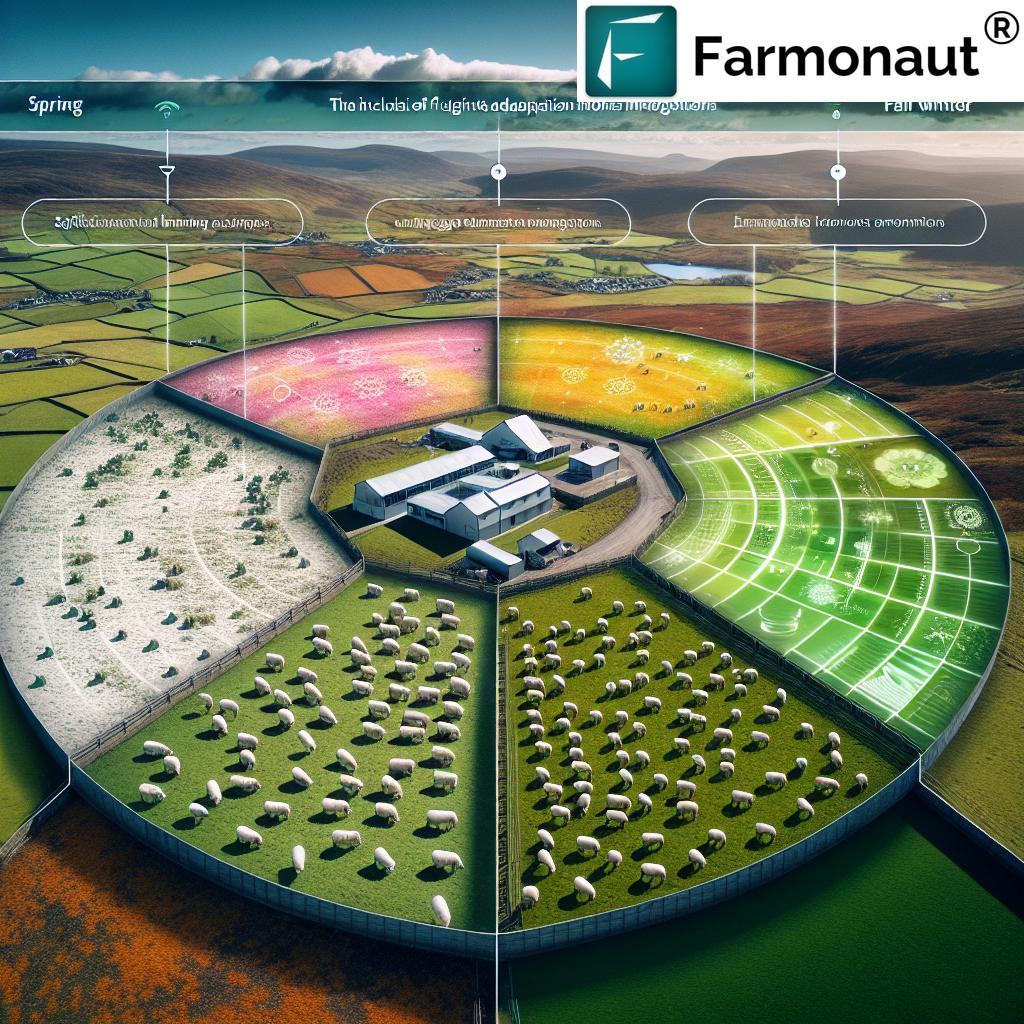
Challenges and Opportunities in Scottish Agriculture
While Scottish agriculture is making significant strides in adopting sustainable and precision farming practices, it still faces several challenges:
- Market Volatility: Fluctuating prices for agricultural products can impact farm incomes.
- Skills Gap: The need for digital literacy and technological expertise in modern farming.
- Infrastructure: Ensuring reliable internet connectivity in rural areas for optimal use of digital farming tools.
- Initial Investment Costs: The upfront expenses of adopting new technologies can be a barrier for some farmers.
However, these challenges also present opportunities for innovation and growth. Farmonaut addresses many of these issues by offering affordable, accessible precision agriculture solutions that don’t require significant infrastructure investments. The company’s mobile apps and web-based platform ensure that farmers can access critical data and insights even in areas with limited connectivity.
The Future of Scottish Agriculture
As we look to the future, several trends are likely to shape Scottish agriculture:
- Increased Automation: From robotic harvesters to AI-driven crop management systems, automation will play a bigger role in farming operations.
- Vertical Farming: Urban and indoor farming solutions may complement traditional agriculture, especially for certain high-value crops.
- Biotechnology Advancements: Developments in crop genetics could lead to more resilient and productive plant varieties.
- Circular Economy Approaches: Greater focus on reducing waste and maximizing resource efficiency throughout the agricultural value chain.
Farmonaut is well-positioned to support these future trends with its adaptable platform and commitment to ongoing innovation. The company’s focus on integrating emerging technologies like blockchain for traceability and advanced AI for predictive analytics aligns well with the evolving needs of Scottish agriculture.
Community Engagement and Knowledge Sharing
The success of sustainable and precision agriculture in Scotland relies heavily on community engagement and knowledge sharing. Initiatives that foster collaboration and learning include:
- Farmer-led Groups: Collectives where farmers share experiences and best practices in adopting new technologies.
- Demonstration Farms: Showcasing successful implementations of precision agriculture and sustainable practices.
- Agricultural Shows: Events like AgriScot provide platforms for farmers to learn about the latest innovations and technologies.
- Digital Learning Platforms: Online resources and webinars that make agricultural education more accessible.
Farmonaut contributes to this knowledge-sharing ecosystem by providing educational resources, hosting webinars, and offering customer support to ensure farmers can make the most of its precision agriculture tools.
The Impact of Brexit on Scottish Agriculture
The UK’s exit from the European Union has significant implications for Scottish agriculture, including:
- Changes in Subsidy Structures: The transition from EU-based subsidies to new UK agricultural policies.
- Trade Dynamics: New trade agreements affecting the export and import of agricultural products.
- Labor Availability: Potential challenges in accessing seasonal workers from EU countries.
- Regulatory Changes: Adapting to new regulations and standards in farming practices and food production.
In this context of change and uncertainty, tools like Farmonaut’s precision agriculture platform become even more valuable. By helping farmers optimize their operations and reduce costs, these technologies can improve resilience and competitiveness in a changing market landscape.
The Role of Livestock in Scottish Agriculture
Livestock farming remains a crucial component of Scottish agriculture, with sheep and cattle being particularly significant. The industry is evolving to meet new challenges:
- Precision Livestock Farming: Using technology to monitor animal health, behavior, and productivity.
- Sustainable Grazing Practices: Implementing rotational grazing and other techniques to improve pasture health and carbon sequestration.
- Genetic Improvements: Breeding for traits that enhance resilience to climate change and improve efficiency.
- Alternative Feed Sources: Exploring sustainable feed options to reduce the environmental impact of livestock farming.
While Farmonaut’s primary focus is on crop monitoring, its technology can also benefit livestock farmers by providing insights into pasture health and land use optimization for grazing.
Arable Farming Innovations in Scotland
Scotland’s arable sector is embracing innovation to boost productivity and sustainability:
- Precision Seeding and Planting: Using GPS-guided equipment for optimal seed placement and spacing.
- Variable Rate Technology: Applying inputs like fertilizers and pesticides at variable rates based on field conditions.
- Crop Rotation Optimization: Using data analytics to plan more effective crop rotations for soil health and pest management.
- Drone Technology: Employing drones for detailed field mapping and crop scouting.
Farmonaut’s satellite-based crop monitoring and AI advisory systems are particularly valuable for arable farmers, providing timely insights that can inform these precision farming practices.
The Growing Importance of Horticulture
While often overshadowed by livestock and arable farming, Scotland’s horticulture sector is gaining prominence:
- Protected Cropping: Expanding use of greenhouses and polytunnels to extend growing seasons and diversify crops.
- Specialty Crops: Focusing on high-value crops like soft fruits and vegetables.
- Urban Farming: Exploring innovative approaches to growing food in and around cities.
- Vertical Farming: Investing in high-tech, indoor farming solutions for year-round production.
Farmonaut’s technology can assist horticultural producers by providing detailed crop health monitoring and growth stage tracking, even for smaller plot sizes typical in horticulture.
Renewable Energy and Scottish Farms
Renewable energy is becoming an integral part of many Scottish farms, offering both environmental and economic benefits:
- Wind Power: Installing wind turbines on farmland to generate electricity.
- Solar Panels: Utilizing roof space or less productive land for solar energy generation.
- Biomass: Converting agricultural waste into energy through anaerobic digestion or biomass boilers.
- Hydroelectric Power: Harnessing the power of streams and rivers on farm properties.
While Farmonaut’s core offerings focus on crop monitoring and management, its land use analysis tools can help farmers identify optimal locations for renewable energy installations, supporting this important trend in farm diversification.
The Importance of Agricultural Shows and Events
Agricultural shows and events play a vital role in the Scottish farming community:
- Knowledge Exchange: Providing platforms for farmers to learn about new technologies and practices.
- Networking: Facilitating connections between farmers, suppliers, and industry experts.
- Showcasing Innovation: Demonstrating the latest agricultural machinery and technology.
- Community Building: Strengthening the social fabric of rural communities.
Events like the Royal Highland Show and AgriScot are important venues for companies like Farmonaut to engage with farmers, demonstrate their technologies, and gather valuable feedback to inform future developments.
Scottish Agriculture Sustainability Metrics
| Farming Sector | Carbon Footprint Reduction (%) | Water Use Efficiency Improvement (%) | Soil Health Improvement (%) | Precision Agriculture Adoption Rate (%) | Government Support Programs Utilization (%) |
|---|---|---|---|---|---|
| Cereals | 15 | 20 | 18 | 65 | 75 |
| Livestock | 10 | 12 | 15 | 40 | 80 |
| Horticulture | 18 | 25 | 20 | 70 | 70 |
| Mixed Farming | 13 | 18 | 17 | 55 | 78 |
Note: Data represents estimated improvements over the past 5 years.
Conclusion: A Bright Future for Scottish Agriculture
As we’ve explored throughout this article, Scottish agriculture is on the cusp of a transformative era. The adoption of precision farming techniques, sustainable land use practices, and innovative technologies is positioning Scottish farmers to meet the challenges of the 21st century head-on. Companies like Farmonaut are playing a crucial role in this transformation, providing farmers with the tools and insights they need to make data-driven decisions and optimize their operations.
The future of Scottish agriculture is one of resilience, sustainability, and innovation. By embracing new technologies and practices, Scottish farmers are not only ensuring their own success but also contributing to global food security and environmental stewardship. As we move forward, the continued collaboration between farmers, technology providers, researchers, and policymakers will be essential in realizing the full potential of Scottish agriculture.
For those looking to stay at the forefront of these agricultural advancements, Farmonaut offers a range of solutions tailored to the needs of Scottish farmers. From satellite-based crop monitoring to AI-powered advisory services, Farmonaut’s platform is designed to support farmers in their journey towards more sustainable and profitable farming practices.
FAQs
- Q: How is precision agriculture benefiting Scottish farmers?
A: Precision agriculture is helping Scottish farmers optimize resource use, improve crop yields, reduce environmental impact, and make data-driven decisions for better farm management. - Q: What role does Farmonaut play in Scottish agriculture?
A: Farmonaut provides satellite-based crop monitoring, AI-powered advisory services, and data analytics tools that help Scottish farmers implement precision agriculture techniques and improve their overall farm management. - Q: How are Scottish farmers adapting to climate change?
A: Scottish farmers are adapting to climate change through various strategies, including crop diversification, improved water management, soil health initiatives, and the adoption of renewable energy sources on farms. - Q: What government support is available for sustainable farming in Scotland?
A: The Scottish government offers support through programs like the Agri-Environment Climate Scheme (AECS) and the Scottish Rural Development Programme (SRDP), which provide funding and advice for sustainable farming practices. - Q: How is technology changing livestock farming in Scotland?
A: Technology is transforming livestock farming through precision livestock management systems, which use sensors and data analytics to monitor animal health, optimize feeding, and improve overall herd management.



